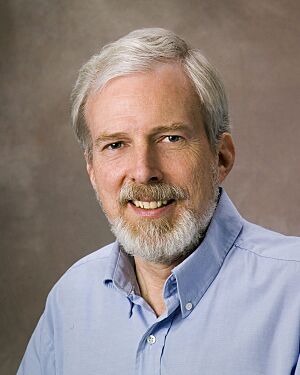Stuart Umpleby facts for kids
Stuart Anspach Umpleby (born in 1944) is an American expert in cybernetics. He is a professor at George Washington University, where he also leads a research program focused on how groups and organizations learn.
Contents
About His Life
Stuart Umpleby went to the University of Illinois Urbana-Champaign. He earned degrees in engineering and political science in the late 1960s. Later, in 1975, he received his PhD in communications.
While he was a student, he worked on early computer systems. He helped develop computer conferencing, which allowed people to talk and share ideas using computers.
After joining George Washington University, he continued to use computers for discussions. From 1977 to 1980, he led an online discussion about general systems theory. He also helped organize meetings between American and Soviet scientists in the 1980s, focusing on cybernetics and systems theory.
Since 1975, he has been a professor at George Washington University. He teaches subjects like cybernetics, systems theory, and how organizations behave. He also explores the philosophy of science, which is about how we gain knowledge.
He used to be the president of the American Society for Cybernetics. In 2007, he received a special award called The Wiener Gold Medal from this society. In 2010, he was chosen to be part of the International Academy for Systems and Cybernetic Sciences, which is an honor society for experts in systems and cybernetics.
What He Studies
Stuart Umpleby's main research areas are cybernetics and systems theory, the philosophy of science, and different management methods. He has also looked into topics like population changes, the "Year 2000 computer problem," and how universities connect globally.
Cybernetics
In the early 1970s, Stuart Umpleby studied cybernetics with important thinkers like Heinz von Foerster. Cybernetics is the study of how systems (like living things, machines, or organizations) control themselves and communicate.
He helped develop ideas like second-order cybernetics, which looks at how the observer (the person studying a system) is also part of the system. He also helped create social cybernetics, which applies these ideas to how societies work. He explained how information works in relation to matter and energy.
Philosophy of Science
Building on his work in cybernetics, Umpleby suggested a way to combine different ideas about how we understand the world. These ideas include:
- Realism: The idea that there's a real world outside of us.
- Constructivism: The idea that we build our own understanding of the world.
- Pragmatism: The idea that what matters is what works in practice.
He suggested that we can combine these by thinking about the world itself, our descriptions of it, and the person observing it. He also believes that for managers, practical methods are often more useful than just theories.
Management Methods
Recently, Umpleby has been working on a tool called the Quality Improvement Priority Matrix. This tool helps organizations figure out what they need to improve first and then track how well they are doing.
Population Changes
In the 1960s, a scientist named Heinz von Foerster wrote about how fast the world's population was growing. He showed that if past trends continued, the population would grow extremely large around the year 2026. This idea was debated, but the calculation was surprisingly accurate for many years.
Discussions about this topic showed that experts who study populations (demographers) and natural scientists sometimes think about estimates in very different ways.
The Year 2000 Computer Issue
From 1997 to 2000, Stuart Umpleby worked on the Year 2000 problem. This was a big concern that computers might have problems when the year changed from 1999 to 2000. He saw this as a chance to test ideas from social science by studying how people and organizations reacted before and after the year change.
Global Learning
In the late 1970s, Umpleby led an early online discussion group for scientists. This project showed how useful electronic communication could be for small research groups.
He continued to explore how the internet could be used for learning and research. He is now developing the idea of academic globalization. This means that professors and researchers can easily work together with colleagues in other countries using the internet for teaching, research, and community projects.
Changes in Post-Communist Countries
After communism ended in 1989, many experts wondered how countries would change from a communist system to a capitalist one. Stuart Umpleby helped organize meetings in 1990 to discuss theories that could guide these big changes in society, economics, and politics.
Since 1994, the research program he leads at George Washington University has hosted over 150 visiting scholars. Most of these scholars came from countries that used to be part of the Soviet Union or from Southeast Europe. While at the university, they learn new ways to improve organizations and work together in groups. This helps them bring positive changes back to their home countries. Umpleby has found that these methods not only make organizations better but also lead to fairer management and build trust among people.
International Academy for Systems and Cybernetic Sciences
Since 2010, Stuart Umpleby has been an Academician in the International Academy for Systems and Cybernetic Sciences. This is an honor society created by the International Federation for Systems Research for leading experts in systems and cybernetics.
See also
- Conceptual system
- Cyberneticist
- Glossary of systems theory
- Management cybernetics
- Mental Health Research Institute (Michigan)
- Second-Order Cybernetics
- Russell L. Ackoff
- Principia Cybernetica
- The Institute of Cultural Affairs International
- Constructivist Foundations


